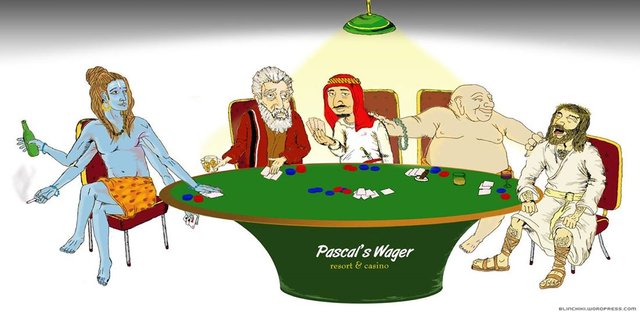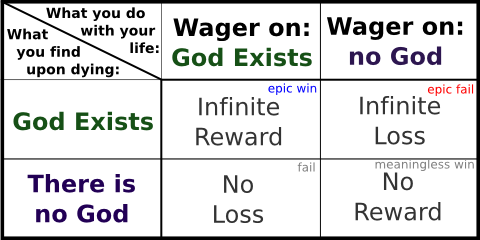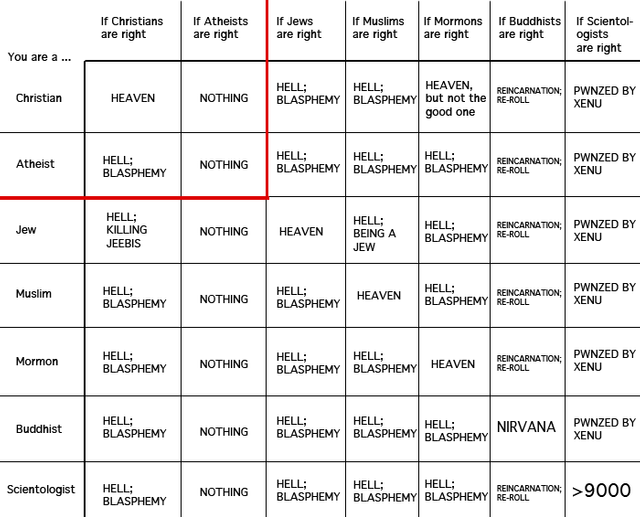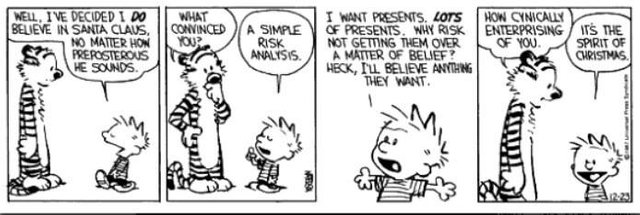
The Problems With Pascal's Wager, And Why It's Really Not a Good Bet
Pascal's Wager was of course, introduced by French scientist and mathematician Blaise Pascal back in the 17th century. Pascal was a Christian, and he wanted to come up with a good justification for his beliefs. Being both a man of science and math, he knows that he cannot produce a satisfactory scientific explanation for the christian god. And so, he instead came up with an explanation based on probability.

The argument of Pascal's wager is this:
- If I am a christian and there is indeed a god, then I go to heaven and I gain a lot.
- If I am a christian and there is no god after all, then I won't go to heaven and I'll just die, and I lose nothing.
- If I am an atheist and there is no god, therefore I am right, I lose nothing, but I gain nothing as well.
- BUT, if I am an atheist and there is indeed a god, then I go to hell, and I lose infinitely.
At first glance this seems an easy option. Pascal claims - just choose to be a christian! Probability-wise, you'll gain the most while risking less! But this "wager" has sneaky holes that we must expose, so as not to fall into a trap of believing mindlessly, just in case.
Flaw of choices
The first major flaw of Pascal's wager is that it assumes only two choices: either no god, or the christian god. But of course, this argument blatantly ignores other religions and gods. If we were to include them in the wager, then it shows that the christian is on equal footing with an atheist in the wager.

The new argument will now look like this:
- If I am a christian and there is no god, then i lose nothing.
- If I am an atheist and there is a god, then I lose everything.
BUT... - If I am a christian and the islamic god is true, I lose everything.
- If I am a christian and the hindu god is true, I lose everything.
- If I am a christian and some other god is true, I lose everything.
Just like any other position, we are all on equal ground if we choose a belief and we are wrong. Being a christian or in any other religion WILL NOT increase or decrease your chances of being "saved."
That is of course, if we ONLY ASSUME the existence of said gods. Why wager when you can use your logic to investigate and learn? This is the core reason why Pascal's wager fails.
Flaw of infinite suffering vs. finite sins

Secondary flaw of Pascal's wager is the threat of "losing everything" A.K.A. eternal suffering in hell.
Why is this a flaw? Because it clearly connotes injustice. Any man with a basic understanding of human pain would understand that giving infinite punishment to a finite crime is UNJUST. It also shows that that god judges, not by good works/bad works, but by belief alone. What kind of a god ignores your good deeds and contributions to humanity, and would torture you to hell forever just because you didn't believe in him?
Is this the real definition of "unconditional love?" Indeed, Pascal's wager tells us that their god's unconditional love has a condition: to believe in him or burn in hell.

Flaw of senseless fear tactics
Third flaw of Pascal's wager: it renders that god some sort of idiot that anyone can fool. Essentially, any man can use this Pascal's wager to "play safe," to believe in god just to avoid punishment.
Does this sound sincere? Does this mean that god does not detect whether one is genuinely believing, or just believing just for the sake of safety?

Well, that gives us the final flaw of this argument: the argument from FEAR. People who use Pascal's wager is essentially scaring the crap out of gullible people into thinking that if they don't take the safe side of believing, the consequence is to "lose forever" AKA hell. Can you imagine telling this wager to little kids who don't know any better? This is equivalent to psychological child abuse.

Photos and images used without permission. All rights reserved to their respective sources.
well the thing is i will become a god in the future but i will let all go to a "hell" that i created if they are not atheist soooo.... the wager got more complex
Downvoting a post can decrease pending rewards and make it less visible. Common reasons:
Submit
Complicated than you never thought it was. :D
Downvoting a post can decrease pending rewards and make it less visible. Common reasons:
Submit
look at my latest post m8 you gonna wanna see that
Downvoting a post can decrease pending rewards and make it less visible. Common reasons:
Submit
I'll look into it
Downvoting a post can decrease pending rewards and make it less visible. Common reasons:
Submit
I have proof of God.
Downvoting a post can decrease pending rewards and make it less visible. Common reasons:
Submit